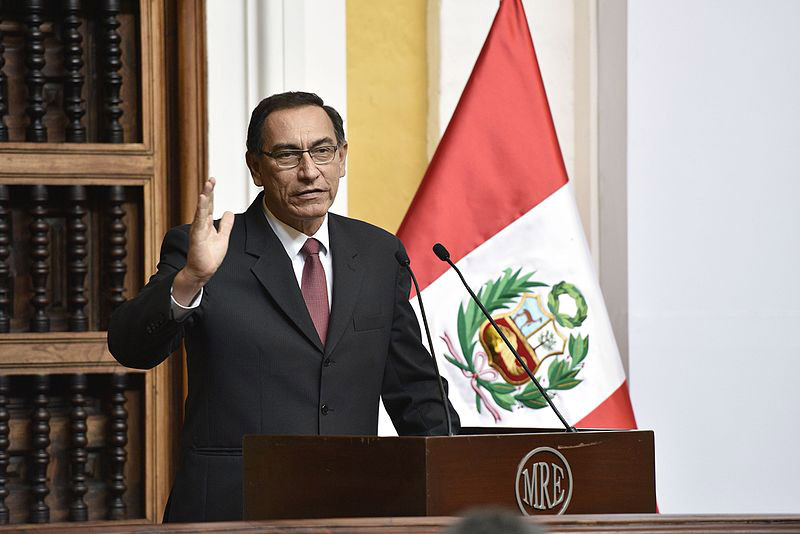LIMA, (Reuters) – Peruvian President Martin Vizcarra dissolved Congress yesterday to end a yearlong battle with rightwing lawmakers over his anti-graft campaign, but rebel legislators refused to leave the chamber as protests against them started across the country.
Peru’s worst political crisis in two decades threatens unrest in the world’s No.2 copper producer and one of the region’s most robust economies, and could bring lawmaking to a halt.
“Peruvian people, we have done all we could,” Vizcarra told the nation in a televised message. He vowed to call new legislative elections to let voters weigh in on a dispute he says has stymied his bid to stamp out graft in the ruling class.
Opposition representatives cried “Dictator” after Vizcarra invoked a constitutional article allowing presidents to dissolve Congress, and immediately voted to declare him temporarily suspended, naming Vice President Mercedes Araoz to replace him.
But a government source said their efforts were void, since Congress was already officially closed.
Vizcarra accused Popular Force, the opposition majority party led by jailed former presidential candidate Keiko Fujimori, of trying to use democratic institutions for personal gain.
The party has dragged its feet on passing his anti-corruption reforms and last week shelved his bill for a snap general election to end the impasse.
The last straw, Vizcarra said, was Congress’ appointment on Monday of a new member to the top court, the Constitutional Tribunal, which would be the likely referee in a legal dispute between Congress and the government. Proposed nominees for up to six of the tribunal’s seven members had drawn fire for links to criminally-suspect judges.
“What happened in Congress underscores the shamelessness to which the parliamentary majority has fallen,” Vizcarra added.
Peru’s mining-powered economy has largely shrugged off increasing bouts of political turmoil in recent years, including the resignation last year of former president Pedro Pablo Kuczynski in a clash with Popular Force.
Kuczynski and Peru’s three other most recent presidents have been ensnared in a massive bribery scandal involving Brazilian builder Odebrecht.
Fujimori, the daughter of former authoritarian president Alberto Fujimori, is in pre-trial detention in a case related to Odebrecht.
The current constitutional crisis comes as economic growth has already been slowed sharply by the U.S.-China trade war.
As dusk fell on Lima, protesters gathered outside Congress to pressure lawmakers to leave, while police in riot gear stood by. Domestic media said protests in support of Vizcarra had also started in other cities across the country.
Most Peruvians in recent opinion polls have expressed support for the dissolution of Congress. Vizcarra is often greeted on the streets with shouts encouraging the move.
Peru’s constitution allows presidents to dissolve Congress to call new elections if lawmakers deliver two votes of no-confidence in a government. The current Congress has already voted once that it had no confidence in the government.
Vizcarra said he counted Congress’ appointment of a new member to the constitutional tribunal as a second vote of no-confidence.
But lawmakers, who voted to renew their confidence in his government on Monday, said he had overstepped constitutional limits by overriding Congress’ powers to appoint tribunal judges.
A former vice president, Vizcarra has emerged as an unlikely champion of an anti-graft movement since taking office last year to replace Kuczynski after he resigned in one of several graft scandals that have discredited institutions.
Some political analysts say conditions in Peru are ripe for an anti-establishment sweep to power in the next elections.
Future generations will look back and see a moment when Peru started to uproot corruption that had long stifled its potential, Vizcarra said. But his opponents viewed the day as historic for a different reason.
“Vizcarra and his ministers will end up in jail. We will end up in history!” said former congressman Jorge del Castillo.






